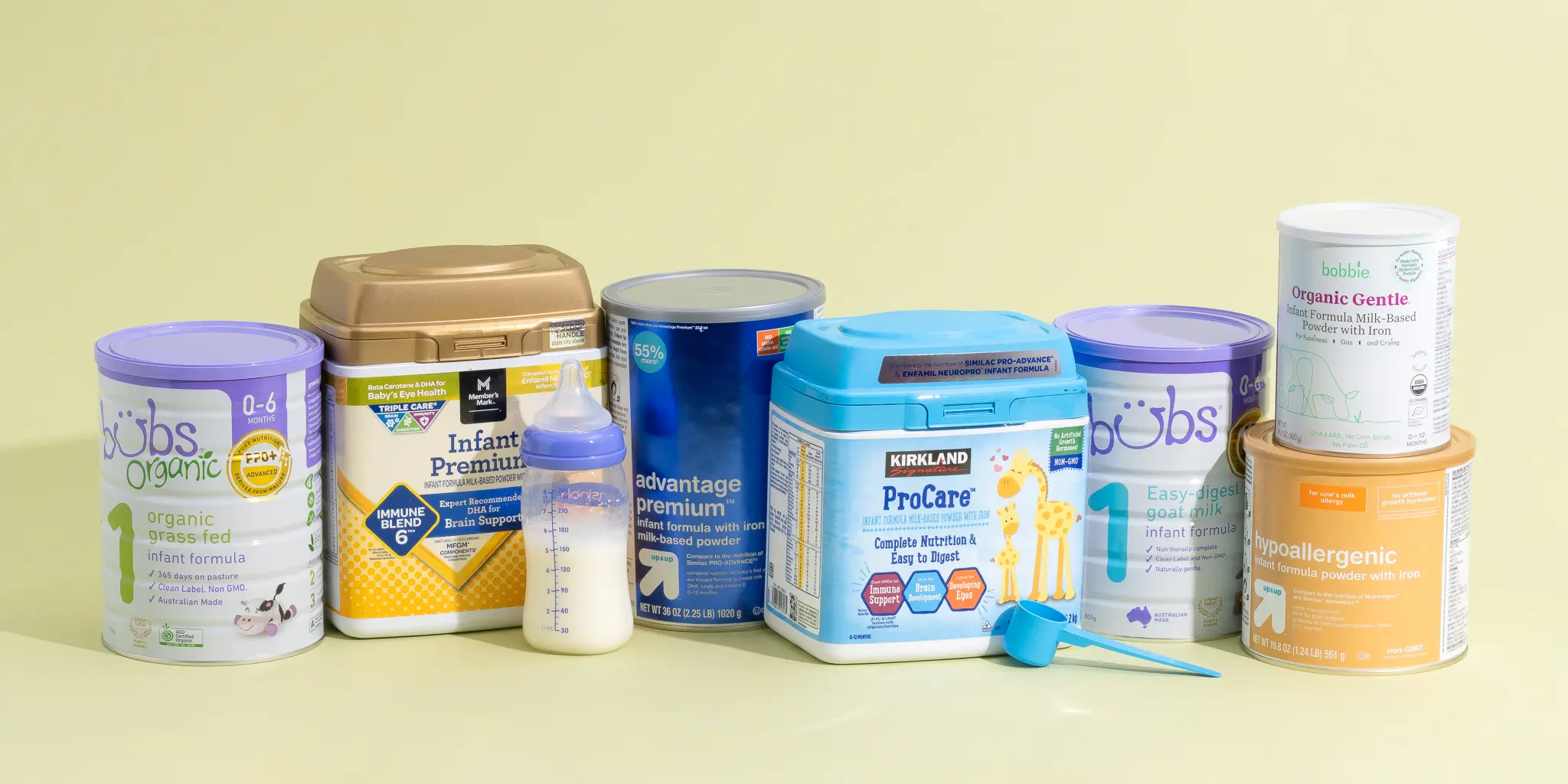There are many choices out there when you’re faced with picking the best formula for your little one. Whether it’s to have as a backup for your breastmilk, or whether you’re having a difficult time with breastfeeding and need to supplement with or rely completely on formula, it’s a good idea to have a grasp of your options when it comes to different brands of formula.
Due to the many formula shortages as well as some manufacturing defects, parents have recently turned to other distribution sources for their formulas. Due to the shortage, the FDA has allowed import of formulas from other countries. European formulas, in particular, have become more popular due to their use of more organic and natural ingredients.
In getting down to the basics, all formulas have a carbohydrate and a protein component. The two most common sources of carbohydrates are lactose and corn syrup. Lactose is a naturally occurring sugar found in breastmilk and cow’s milk, while corn syrup is a sweetener made from corn starch. Both US and EU formulas have roughly 40% of carbohydrates in their composition, but they differ on which carbohydrate they use. Some US formulas have lactose as their carbohydrate source such as Enfamil NeuroPro, Similac pro Advance and Nestle Nan Pro, however most of the other formulas, especially the hypoallergenic ones, contain some element of corn starch. Due to EU regulations, EU formulas aren’t allowed to include corn syrup or sucrose in their formulas, and therefore are made of lactose.
Another important distinguishing factor in formulas is fat content. Fat content is important as it provides roughly 50% of calories in formula. Most US formulas use non-fat cow’s milk and a blend of other fats such as vegetable oils, whereas EU formulas use whole milk as their source of fat, which is more naturally occurring.
Formulas also vary in their DHA or omega-3 fatty acid content, which is essential for brain and neural development, so it is important to make sure you pick a formula which includes DHA in its composition.
While choosing a non-US made formula may have some benefits, it is important to consider that the FDA hasn’t sanctioned or regulated all of them, so it is important to pay attention to some of the following components. Some labels aren’t in English, so instructions pertaining to mixing, storage and best by dates can be misconstrued. Furthermore, scoop sizes or mixing portions aren’t standard across every country, so it is vital to ensure you prepare formulas correctly to avoid any electrolyte or nutritional imbalances in your child.
In response to shortages and to expand available options, the FDA has granted temporary approval for some non-U.S.-made infant formulas to be sold in the U.S. under emergency provisions. These approvals are part of the FDA’s Infant Formula Enforcement Discretion Policy, which allows certain foreign formulas that meet safety, quality, and labeling standards to be sold in the U.S., even if they do not fully comply with typical FDA regulations.
As of 2023, the following non-U.S.-made pediatric formulas have been approved for sale in the U.S.:
- Kendamil (UK)
Manufacturer: Kendal Nutricare
Country: United Kingdom
Key Features: Organic, whole milk-based formula. Kendamil formulas are known for their use of whole milk instead of skimmed milk and the absence of palm oil. They focus on clean ingredients and organic options. - Aptamil (EU)
Manufacturer: Danone
Country: Europe (France, Germany, and the UK are key markets)
Key Features: Aptamil formulas have a strong presence in Europe and are designed to closely mimic the nutritional content of breast milk. They often include DHA and prebiotics for gut health. Aptamil offers both standard and specialty formulas (e.g., hypoallergenic). - Bubs (Australia)
Manufacturer: Bubs Australia
Country: Australia
Key Features: Bubs specializes in organic cow’s milk and goat’s milk formulas. They are known for clean ingredients and focus on non-GMO, organic options, with formulas that are highly digestible for sensitive stomachs. - Similac (Ireland)
Manufacturer: Abbott Laboratories (Similac is a U.S. brand but produced globally)
Country: Ireland
Key Features: Though a U.S. brand, Abbott produces some Similac formulas in Ireland, which have been approved for import. These formulas generally follow similar nutritional guidelines to U.S.-made Similac products, with slight variations based on regional regulations. - Nestlé NAN SupremePro (Germany)
Manufacturer: Nestlé
Country: Germany
Key Features: NAN formulas are popular across Europe and feature DHA, ARA, and probiotics. They are designed to support brain and immune development and are available in several stages for different infant ages. - HiPP (Germany/UK)
Manufacturer: HiPP GmbH & Co. Vertrieb KG
Country: Germany and the UK
Key Features: HiPP is well-known for its organic formulas and strict standards. Their formulas include prebiotics and probiotics, DHA, and organic milk. HiPP has several specialized options for sensitive infants (e.g., hypoallergenic, comfort formulas). - SMA Nutrition (UK)
Manufacturer: Nestlé
Country: United Kingdom
Key Features: SMA Nutrition formulas are made by Nestlé and cater to various stages of infant development. They include a balance of essential vitamins and minerals, DHA, and often probiotics. They are popular in the UK and approved under the FDA’s import policy. - Goat Milk Formula (UK and EU)
Brands: Several goat milk-based formulas, such as Holle (Switzerland) and Kabrita (Netherlands), have received approval.
Key Features: Goat milk formulas are an alternative for infants sensitive to cow’s milk protein. They are rich in essential fatty acids, easily digestible, and often organic. These formulas focus on natural, clean ingredients. - Löwenzahn Organics (Germany)
Manufacturer: Löwenzahn Organics GmbH
Country: Germany
Key Features: Löwenzahn Organics is a newer brand offering organic, sustainably produced formulas with ingredients sourced from certified organic farms. Their products are designed to provide essential nutrients while adhering to strict European standards.
The formulas approved under the FDA’s enforcement discretion must meet certain criteria, including:
- Adequate levels of essential nutrients (e.g., iron, DHA, and others).
- Safe manufacturing practices to ensure formula quality and safety.
- Proper labeling to ensure U.S. consumers understand ingredients and preparation instructions.
Here’s a list of popular U.S.-made infant formulas along with their carbohydrate, protein, and fat content, as well as key defining features. This breakdown is based on the major brands available in the U.S. and includes both standard and specialized formulas.
1. Similac Pro-Advance
- Carbohydrates: 10.7 g per 100 kcal
- Protein: 2.07 g per 100 kcal
- Fat: 5.4 g per 100 kcal
- Key Features:
- Primary Carbohydrate: Lactose.
- Contains 2′-FL HMO (Human Milk Oligosaccharide) to support immune health.
- Does not contain artificial growth hormones.
- Includes DHA and Lutein for brain and eye development.
- Non-GMO formula available
2. Enfamil NeuroPro Infant
- Carbohydrates: 11.2 g per 100 kcal
- Protein: 2.1 g per 100 kcal
- Fat: 5.3 g per 100 kcal
- Key Features:
- Primary Carbohydrate: Lactose.
- Contains MFGM (Milk Fat Globule Membrane) and DHA, which support cognitive development.
- Contains Dual Prebiotics to support immune system health.
- Non-GMO ingredients.
- Designed to mimic breast milk closely with added nutrients for brain and eye development.
3. Gerber Good Start GentlePro
- Carbohydrates: 10.7 g per 100 kcal
- Protein: 2.0 g per 100 kcal
- Fat: 5.3 g per 100 kcal
- Key Features:
- Primary Carbohydrate: Lactose.
- Contains DHA and Probiotics to support brain and gut health.
- Made with Comfort Proteins, which are partially hydrolyzed proteins to aid digestion.
- Contains 2′-FL HMO to support immune health.
4. Earth’s Best Organic Dairy Infant Formula
- Carbohydrates: 11.2 g per 100 kcal
- Protein: 2.0 g per 100 kcal
- Fat: 5.3 g per 100 kcal
- Key Features:
- Primary Carbohydrate: Lactose.
- Certified organic formula with no added corn syrup solids.
- Contains DHA and ARA for brain and eye development.
- Made with organic milk from cows fed organic grain and hay.
5. Similac Sensitive
- Carbohydrates: 10.8 g per 100 kcal
- Protein: 2.07 g per 100 kcal
- Fat: 5.4 g per 100 kcal
- Key Features:
- Primary Carbohydrate: Corn syrup (for lactose-sensitive babies).
- Designed for infants with lactose sensitivity.
- Contains 2′-FL HMO and DHA to support immune health and brain development.
- Does not contain artificial growth hormones.
6. Enfamil Gentlease
- Carbohydrates: 11.4 g per 100 kcal
- Protein: 2.1 g per 100 kcal
- Fat: 5.3 g per 100 kcal
- Key Features:
- Primary Carbohydrate: Corn syrup solids and lactose.
- Partially hydrolyzed proteins to ease digestion and reduce gas and fussiness.
- Contains DHA and MFGM for cognitive development.
- Non-GMO formula available.
- Lower lactose content than standard formulas for sensitive infants.
7. Gerber Good Start Soy
- Carbohydrates: 11.06 g per 100 kcal
- Protein: 2.45 g per 100 kcal
- Fat: 5.39 g per 100 kcal
- Key Features:
- Primary Carbohydrate: Corn maltodextrin.
- Made from soy protein isolate, ideal for infants with cow’s milk protein sensitivity or lactose intolerance.
- Contains DHA and Probiotics for brain and digestive health.
- Lactose-free formula.
8. Similac Alimentum
- Carbohydrates: 10.9 g per 100 kcal
- Protein: 2.75 g per 100 kcal
- Fat: 5.51 g per 100 kcal
- Key Features:
- Primary Carbohydrate: Corn maltodextrin.
- Extensively hydrolyzed protein formula designed for infants with severe allergies to cow’s milk protein.
- Contains DHA and ARA for brain and eye development.
- Lactose-free and hypoallergenic, suitable for infants with colic due to protein sensitivity.
9. Enfamil Nutramigen
- Carbohydrates: 11.4 g per 100 kcal
- Protein: 2.8 g per 100 kcal
- Fat: 5.3 g per 100 kcal
- Key Features:
- Primary Carbohydrate: Corn syrup solids.
- Hypoallergenic formula with extensively hydrolyzed casein proteins for infants with severe milk protein allergies.
- Contains DHA and ARA to support brain and eye development.
- Lactose-free and designed to reduce colic symptoms due to protein allergies.
- Contains Lactobacillus GG, a probiotic that helps support digestive health.
10. Parent’s Choice (Walmart) Organic Infant Formula
- Carbohydrates: 11.2 g per 100 kcal
- Protein: 2.07 g per 100 kcal
- Fat: 5.3 g per 100 kcal
- Key Features:
- Primary Carbohydrate: Lactose.
- USDA Certified Organic.
- Non-GMO ingredients.
- Contains DHA and ARA for brain and eye development.
- Affordable organic option, typically less expensive than other organic brands.
11. Happy Baby Organic Infant Formula
- Carbohydrates: 11.3 g per 100 kcal
- Protein: 2.1 g per 100 kcal
- Fat: 5.4 g per 100 kcal
- Key Features:
- Primary Carbohydrate: Lactose.
- Certified USDA Organic with non-GMO ingredients.
- Contains DHA and ARA sourced from algae.
- Contains prebiotics (FOS and GOS) for gut health.
- No corn syrup or carrageenan.
12. EleCare (Abbott)
- Carbohydrates: 11.2 g per 100 kcal
- Protein: 3.3 g per 100 kcal
- Fat: 5.3 g per 100 kcal
- Key Features:
- Primary Carbohydrate: Corn syrup solids.
- Amino acid-based formula for infants with severe allergies, including those to proteins from cow’s milk and soy.
- Extensively hypoallergenic and used for infants with multiple food allergies or intolerances.
- Contains DHA and ARA for brain and eye development.
13. ByHeart (ByHeart Brand)
- Carbohydrates: 10.3 g per 100 kcal
- Protein: 2 g per 100 kcal
- Fat: 5.8 g per 100 kcal
- Key Features:
- Primary Carbohydrate: Lactose.
- Ingredients: organic, grass-fed whole milk.
- Free of: corn syrup, gluten, soy, maltodextrin, hexane-extracted DHA, and palm oil.
- Clean Label Project certification: ByHeart was the first infant formula to receive the Clean Label Project’s highest-tier Purity Award, after testing for 700 contaminants.
Summary for US formulas:
- Standard formulas (e.g., Similac Pro-Advance, Enfamil NeuroPro) typically use lactose as the primary carbohydrate and contain essential fatty acids like DHA and ARA for brain development.
- Specialty formulas (e.g., Similac Sensitive, Enfamil Gentlease) often use corn syrup or other alternative carbohydrates to accommodate lactose-sensitive babies.
- Hypoallergenic formulas (e.g., Similac Alimentum, Nutramigen) rely on hydrolyzed or amino acid-based proteins to reduce allergic reactions.


